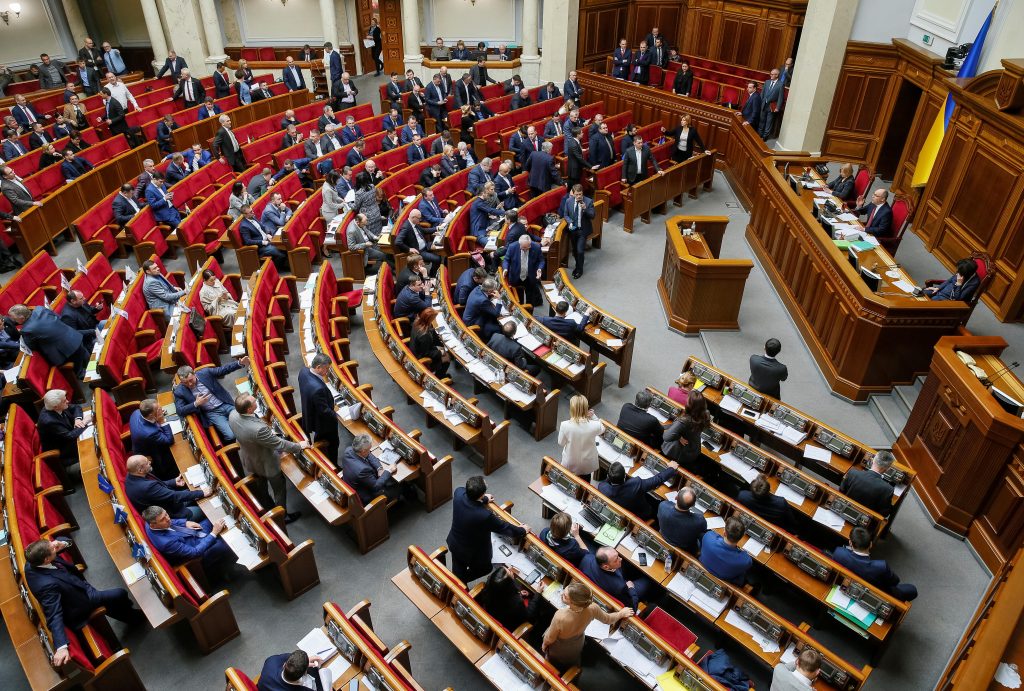Before Ukraine’s new president Volodymyr Zelenskiy was even elected, an opposition leader was plotting to curb his powers and make it easier for him to be impeached.
Andriy Sadovyi, head of the Samopomich party, the second largest opposition group in parliament, announced two days before the vote he was garnering support for a parliamentary bill to weaken the presidency.
The opening salvo is a measure of the hostility that may be in store for Zelenskiy, a 41-year-old comedian who beat incumbent president, Petro Poroshenko, in Sunday’s election despite having no prior political experience or representation in parliament.
Zelenskiy is expected to take office next month. His ability to work with parliament, known as the Rada, will be crucial to meeting the expectations of his voters and passing reforms to keep foreign aid flowing.
Lawmakers from Samopomich and other parties feel the president has too many powers.
“Let him have responsibility like other political players, he cannot stand above the law,” Oksana Syroyid, a Samopomich lawmaker and deputy speaker in parliament told Reuters.
Zelenskiy’s powers will include appointing the head of the state security service, the head of the military, the general prosecutor, the central bank governor and the foreign and defence ministers.
But parliament must confirm each appointment and although Zelenskiy beat the incumbent decisively in the presidential vote and his party could win the largest number of seats in parliamentary elections in October it is unlikely to win an outright majority, opinion polls show.
This means he would need to ally with at least one other party if he is to get his election pledges enacted and his appointments approved. He has not indicated which parties he would be prepared to work with.
Adding to the hostility is his election promise for a bill to strip lawmakers, and himself, of immunity from prosecution.
Volodymyr Ariev, a lawmaker from Poroshenko’s faction, told Reuters it was unlikely that parliament would back that move because lawmakers fret about being prosecuted in political vendettas.
Zelenskiy also needs lawmakers to pass legislation that matters to the International Monetary Fund, Ukraine’s most important foreign backer, such as a bill to criminalize illegal enrichment by officials.
Stuart Culverhouse, Head of Sovereign and Fixed Income Research at Tellimer, said lawmakers might not back that bill until after October. This could lead to delays in IMF tranche disbursements under the $3.9 billion assistance programme. The next one is due in May.
“This could be enough to burst the pre-election Zelenskiy market bubble,” he said.
Yields have fallen as investors became more comfortable with Zelenskiy and also because another presidential candidate Yulia Tymoshenko — who was hostile to some major reforms — was knocked out of the running.
“What do the tariffs have to do with the president? Today he (the president) has influence – he appoints the chairman of the NEURC.”
Tymoshenko, another opposition leader who ran in the election against Zelenskiy, has previously also called for the president’s powers to be curbed.
“It may be necessary to… more clearly define what the president can and cannot do,” Oleksiy Riabchyn, a lawmaker in Tymoshenko’s party told Reuters.
The government is led by Prime Minister Volodymyr Groysman, who was appointed by Poroshenko. He is expected to stay in power until the October election. If Zelenskiy wins enough seats in parliament, he is expected to form a new government.
This means that until those elections, he may struggle to make any significant changes.
“This might prove difficult, as part of the political elite is likely to attempt to paralyse Mr Zelenskiy’s presidency.”
Zelenskiy could try and bring forward the parliamentary election now while his popularity may be at a peak. But he would only be able to do that with parliament’s blessing.
“If parliament does not support the president’s initiatives it will be very hard to explain to Ukraine’s voters why not,” Dmytro Razumkov, an adviser to Zelenskiy’s campaign, told Reuters.
“It’s up to lawmakers. I hope their political survival instincts will dominate.”


